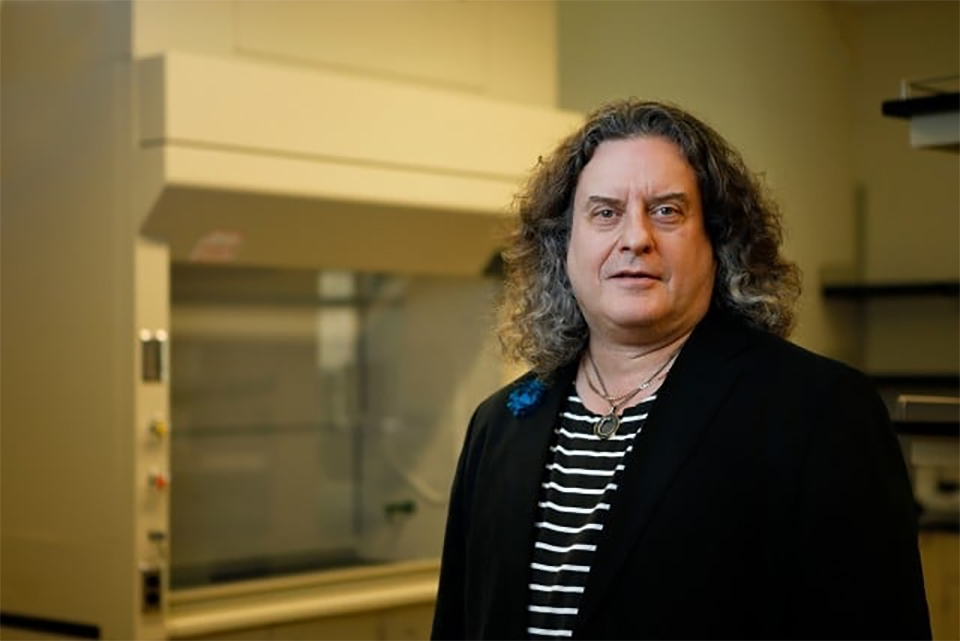
DR. JOHN BLANGERO (UTRGV Archive Photo)
News Release | Research

DR. JOHN BLANGERO (UTRGV Archive Photo)
Monday, May 14, 2018
Research, Community
By Jennifer Berghom
RIO GRANDE VALLEY, TEXAS – The South Texas Diabetes and Obesity Institute (STDOI) at The University of Texas Rio Grande Valley School of Medicine has received a five-year, $3.6 million grant from the National Institutes of Health’s National Institute for Minority Health and Health Disparities, to study the environmental determinants of fatty liver disease in Mexican Americans.
The project, led by Dr. John Blangero, professor and director of the Genomics Computing Center at the STDOI and interim chair of the Department of Immunology and Microbiology at the UTRGV School of Medicine, will use magnetic resonance imaging to study liver fat and liver stiffness, which indicate fatty liver disease.
The STDOI is partnering with UT Health San Antonio’s Research Imaging Institute, under a subcontract led by Dr. Geoff Clarke, to take the MRIs, said Blangero, who is the project’s principal investigator. Clarke is the project’s co-principal investigator.
“Fatty liver disease is a significant public health problem in South Texas and represents a major risk factor for liver cancer,” Blangero said. “Our project is focused on identifying environmental factors involved in fatty liver disease risk using a novel approach in which we increase these environmental signals by controlling for genetic factors.”
This is the first time this method has ever been used and is a previously unrealized benefit of the human genome project, Blangero said.
Scientists will perform thousands of different measurements reflecting human biological variation and look for those variations that help predict fatty liver disease, then track down their source in the environment.
Blangero said he hopes the team’s findings can lead to the creation of treatments and medications, as well as measures of prevention.
The project will focus a sample of 1,000 Mexican Americans in large families from across South Texas –including the Rio Grande Valley—whom the institute has been studying since 1991.
Dr. John H. Krouse, dean of the UTRGV School of Medicine and executive vice president for Health Affairs at UTRGV, said the grant will advance the School of Medicine’s mission to engage in research that will benefit the Rio Grande Valley and the world.
“The School of Medicine is committed to participating in research in relevant areas of concern for health and disease in the Hispanic population, including cancer, diabetes, obesity and related diseases,” Krouse said. “This project addresses illnesses that greatly affect the Hispanic population, and can lead to innovations that will improve health outcomes for this population.”
The grant runs through Nov. 30, 2022.
ABOUT UTRGV
The University of Texas Rio Grande Valley (UTRGV) was created by the Texas Legislature in 2013 as the first major public university of the 21st century in Texas. This transformative initiative provided the opportunity to expand educational opportunities in the Rio Grande Valley, including a new School of Medicine and a School of Podiatry, and made it possible for residents of the region to benefit from the Permanent University Fund – a public endowment contributing support to the University of Texas System and other institutions.
UTRGV has campuses and off-campus research and teaching sites throughout the Rio Grande Valley including Brownsville (formerly The University of Texas at Brownsville campus), Edinburg (formerly The University of Texas-Pan American campus), Harlingen, Weslaco, McAllen, Port Isabel, Rio Grande City and South Padre Island. UTRGV, a comprehensive academic institution, enrolled its first class in the fall of 2015; the School of Medicine welcomed its first class in the summer of 2016, and the School of Podiatric Medicine in the fall of 2022.